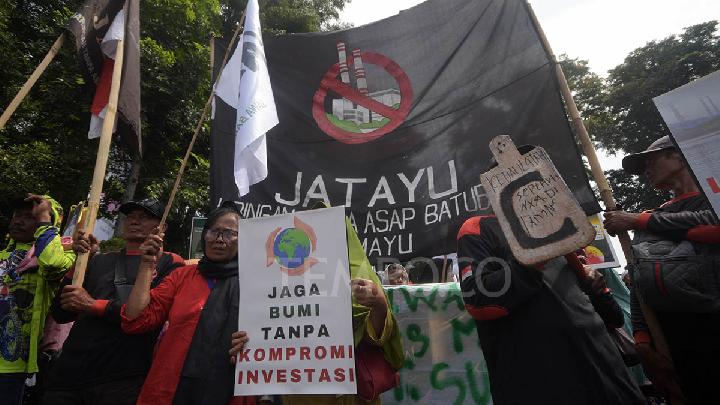TEMPO.CO, Jakarta - Listya Endang Artiani, a lecturer and researcher at the Islamic University of Indonesia (UII), views the current trend of widespread gold purchases, despite escalating prices, as an unusual economic indicator. According to her, the nation needs to interpret these market signals as more than just an isolated economic symptom, suggesting underlying negative expectations for Indonesia's economic trajectory.
"The gold hoarding phenomenon also reflects a growing distrust towards existing monetary and fiscal policies," said Listya in a written statement to Tempo on Monday, April 21, 2025.
For context, the price of gold has experienced a significant increase in recent weeks. At the beginning of April, the price per troy ounce (31.1 grams) reached around US$3,350. Based on the rupiah to US dollar exchange rate of approximately Rp16,800, the price of gold is around Rp1.8 million per gram.
Listya said that the trend of buying gold even when the price is soaring can be interpreted as a public effort to protect value (store of value). This economic phenomenon occurs as global turbulence and increasing economic uncertainty, considered threats to Indonesia's economy, intensify.
Individuals are accumulating gold in an attempt to shift assets to this precious metal, as gold is considered a safe haven asset or a savings instrument capable of preserving its value during systemic pressure on the financial market, due to gold's low, even negative, correlation with assets such as stocks and bonds.
"It becomes an effective value protector during times of crisis or economic uncertainty," said the lecturer in the Department of Economics, Faculty of Business and Economics, UII, Yogyakarta.
According to Listya, the phenomenon of shifting assets into gold could pose a danger to the future economy. This is because, she explained, this trend could incur an opportunity cost to finance the real sector. Consequently, funds that should be used for productive investment end up being stored in non-productive assets like gold.
Recent data from Bank Indonesia (BI) indicates a slowdown in deposit growth during the first quarter of 2025 compared to the preceding period. This trend reflects a discernible shift in investors' and the public's preferences towards alternative investment instruments, such as precious metals, amidst global economic uncertainty and financial market volatility.
"In the context of the crowding-out effect theory, this massive shift could disrupt the intermediary function of financial institutions, especially if driven by negative sentiment towards monetary policies," said Listya.
As the looming danger is significant, according to Listya, the government and central bank must promptly respond with policies that can restore public confidence in economic stability.

Listya Endang Artiani, a lecturer and researcher at the Islamic University of Indonesia (UII)
Listya Endang offers the following recommendations to address this phenomenon:
1. Improvement of Monetary Policy Communication (Forward Guidance)
Bank Indonesia needs to optimize the utilization of policy communication instruments, such as forward guidance, to clearly articulate the anticipated trajectory of monetary policies and the measures being taken to address inflation and exchange rate stability. This will provide the public and investors with a clearer understanding of the nation's economic policy direction.
"This will consequently reduce the reliance on gold as the primary alternative store of value," she stated.
2. Diversification of Competitive and Inclusive Investment Instruments
The government needs to offer a more diverse and competitive array of investment instruments to the public. This could involve increasing accessibility to Retail Sukuk, Retail Government Bonds (ORI), as well as investment products based on green bonds and impact investing aimed at financing sustainable development projects.
"These instruments will not only offer attractive returns but also contribute to broader economic development," Listya noted.
3. Improvement of Financial Literacy and Investment Education
According to Listya, education on smart and productive investments should be a priority for financial institutions and the government. The public needs to have a better understanding of the potential risks and returns of various investment instruments. Enhanced financial literacy will empower investors to make more rational investment decisions, rather than being solely driven by market trends or herd behavior.
4. Regulation and Monitoring of Non-Productive Assets
While gold serves as a value protection tool, there needs to be stricter regulations on gold trading, especially in physical form, to avoid the risk of reducing financial system transparency. Regulations that promote the recording of gold ownership in the formal financial system will expand the country's tax base and help the government make more accurate fiscal planning.
5. Strengthening the Capital Market Ecosystem
In addition to promoting non-gold investment instruments, Listya said that strengthening Indonesia's capital market should be a long-term policy priority. The government and capital market authorities need to expedite the formation and development of a more inclusive stock market.
"Where investors can access a variety of safe and profitable financial products, which in turn can reduce dependence on precious metals as the main investment alternative," she said.
According to Listya, while gold plays a crucial role as a value protector during periods of uncertainty, the decision to invest in gold must be considered within a broader context where other productive investment instruments can also significantly contribute to the nation's economic growth.
"For this reason, policies that prioritize financial literacy, market transparency, and investment diversification will be essential in guiding the public towards a more productive, sustainable, and stable economic direction," Listya concluded.
Editor's Choice: Jewelry and Bullion Gold: Which Is the More Profitable Investment?
Click here to get the latest news updates from Tempo on Google News












































